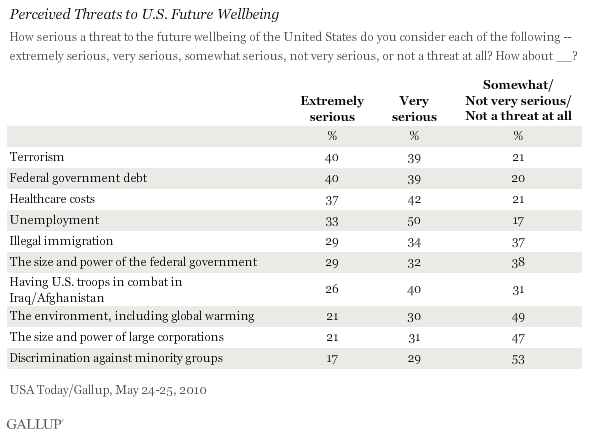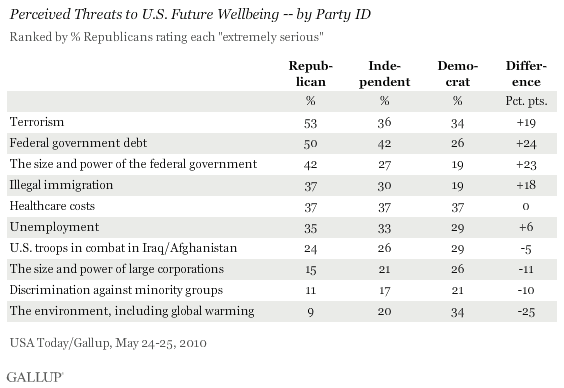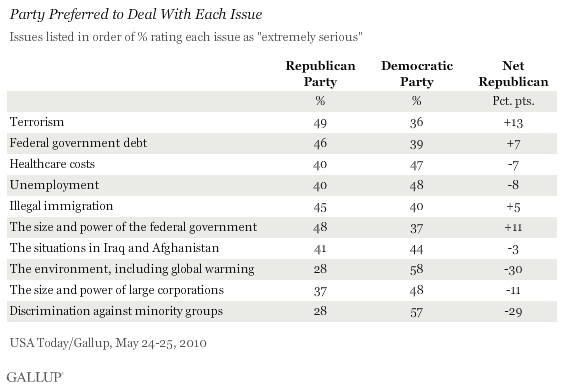PRINCETON, NJ -- Terrorism and federal government debt tie as the most worrisome issues to Americans when they consider threats to the future well-being of the U.S. Four in 10 Americans call each an "extremely serious" threat, with healthcare costs ranking a close third.

On a broader basis, a majority of Americans consider all but 1 of the 10 issues rated in the May 24-25 USA Today/Gallup poll as either "extremely serious" or "very serious" threats. Discrimination against minority groups is the sole exception, with 46% calling it extremely or very serious.
Partisans Rank Issues Differently
The overall scores for terrorism and the federal debt are boosted by the relatively high percentages of Republicans -- 50% or more -- who consider each of these extremely serious, putting these at the top of the Republicans' list. The size and power of the federal government ranks third among Republicans. The top three issues for Democrats are healthcare costs, the environment/global warming, and terrorism. However, no more than 37% of Democrats call any of these issues "extremely serious."
The federal budget deficit ranks as the top issue concern for independents -- 42% call it extremely serious -- thus aligning independents closer to Republicans than to Democrats on this issue. By contrast, independents' 36% rating for terrorism is closer to Democrats' than to Republicans' rating.

The greatest gaps between Republicans and Democrats -- exceeding 20 percentage points -- are seen for the environment/global warming (about which Democrats are more concerned), and the federal debt and the size of government (issues for which the Republicans show greater concern).
Republican Party Preferred on Top Issue Concerns
The Republican Party is preferred over the Democratic Party for handling the two top-ranking issues of public concern -- terrorism and federal government debt. The Democratic Party is preferred by much wider margins for the environment and discrimination against minority groups -- but these are among the least worrisome issues to Americans.

Bottom Line
Of several potential threats to the future well-being of the United States, Americans seem most concerned about terrorism and several economic matters -- the federal budget debt, healthcare costs, and unemployment.
Americans are far less likely to consider other domestic issues, including illegal immigration and the environment, as serious threats. Regarding the current immigration debate over balancing U.S. security concerns with fair treatment of illegals, however, many more Americans say illegal immigration is an extremely serious threat than say this about discrimination against minority groups.
Results are based on telephone interviews conducted May 24-25, 2010, with a random sample of 1,029 adults, aged 18 and older, living in all 50 U.S. states and the District of Columbia, selected using a random-digit-dial sampling technique.
For results based on the total sample of national adults, one can say with 95% confidence that the maximum margin of error is ±4 percentage points.
Interviews are conducted with respondents on landline telephones and cellular phones, with interviews conducted in Spanish for respondents who are primarily Spanish-speaking. Each sample includes a minimum quota of 150 cell phone respondents and 850 landline respondents, with additional minimum quotas among landline respondents for gender within region. Landline respondents are chosen at random within each household on the basis of which member had the most recent birthday.
Samples are weighted on the basis of gender, age, race, Hispanic ethnicity, education, region, adults in the household, cell phone only status, cell phone mostly status and phone lines. Demographic weighting targets are based on the March 2009 Current Population Survey figures for the aged 18 and older non-institutionalized population living in U.S. telephone households. All reported margins of sampling error include the computed design effects for weighting and sample design.
In addition to sampling error, question wording and practical difficulties in conducting surveys can introduce error or bias into the findings of public opinion polls.
